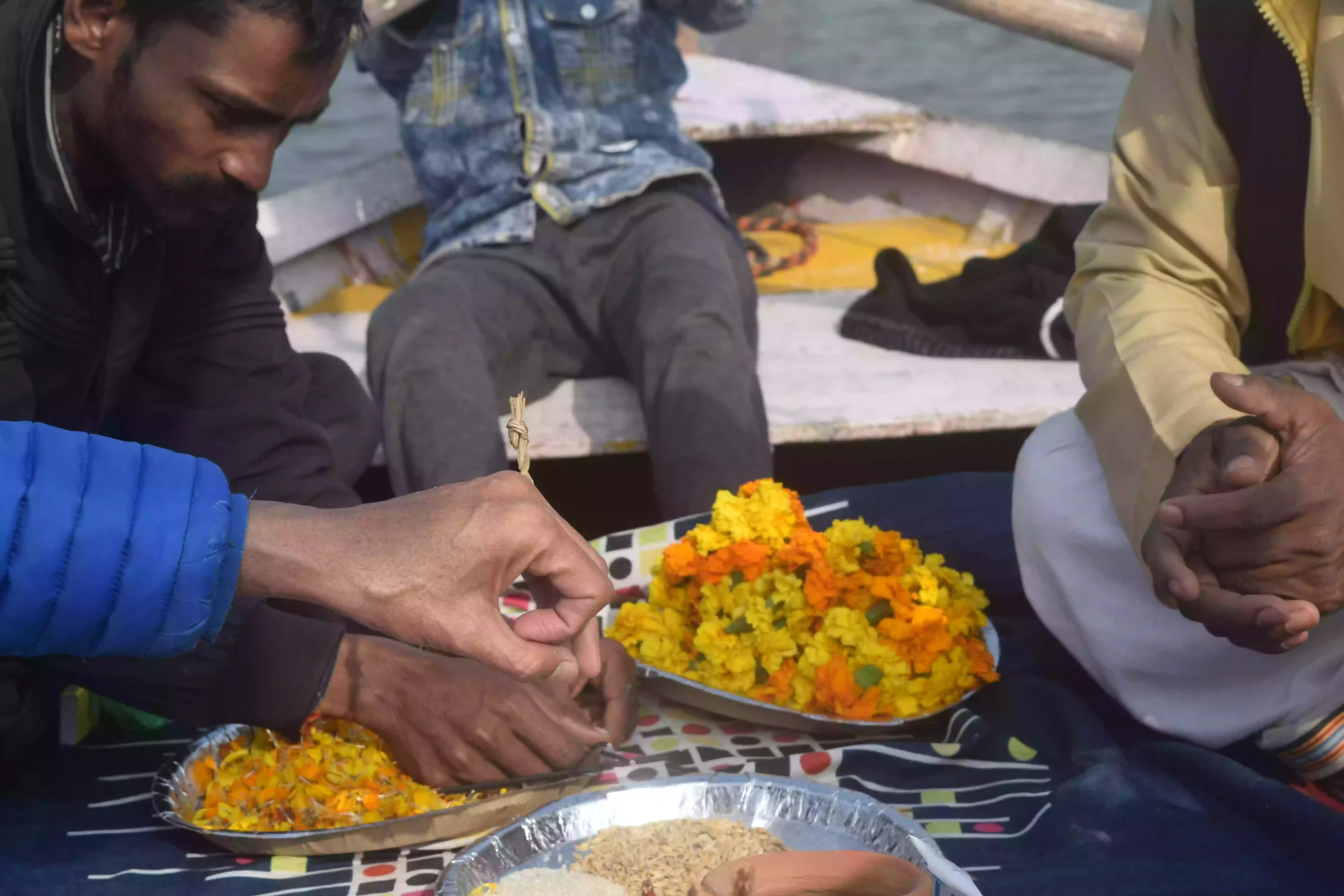Introduction – Significance of Pitrupaksha
As the monsoon rains begin to subside and we move into the Bhadrapada month, the Hindu calendar turns towards a period of profound spiritual importance. This is Pitrupaksha, the sacred fortnight for honouring our ancestors, which in 2025 will be observed from September 7th to September 21st.

While many are familiar with the rituals of Tarpan and Pind Daan, the true essence of this period goes far beyond mere tradition. At Prayag Pandits, our learned acharyas have spent generations not only performing these rites at the holy Triveni Sangam but also imparting their profound spiritual meaning. This is not a time for celebration, but for introspection, gratitude, and a powerful energetic exchange that bridges the realms of the living and the ancestors.
Let us explore the spiritual science and profound significance behind Pitrupaksha.
1. Significance of Pitrupaksha – Beyond Remembrance: Fulfilling the Sacred Duty of Pitru Rin
Hindu philosophy teaches us that every individual is born with three primary debts (rins):
- Dev Rin: The debt to the Gods, repaid through yajnas and worship.
- Rishi Rin: The debt to the sages, repaid by studying and propagating sacred knowledge.
- Pitru Rin: The debt to our ancestors, for granting us this very life.
Prayag Pandits explains that Pitru Rin is perhaps the most fundamental of all. We owe our existence, our lineage, our genetics, and our family traditions to the generations that came before us. Pitrupaksha is the one special period in the year dedicated exclusively to acknowledging and repaying this sacred debt. It is an act of profound gratitude, a recognition that we are not isolated individuals but links in an ancient, unbroken chain of life.
2. The Journey of the Soul and the Realm of the Pitrus
Where do our ancestors reside? The Garuda Purana and other sacred texts describe the Pitru Loka—a subtle realm where souls reside after departing the physical world, awaiting their next birth or final liberation (moksha). It is believed that the souls in this realm can experience hunger, thirst, and restlessness. They are dependent on the positive energy and offerings sent by their descendants.
The rituals performed during Pitrupaksha are not mere symbolism. Prayag Pandits teaches that they are a form of spiritual nourishment.
- The water offered during Tarpan quenches their spiritual thirst.
- The food offered during Pind Daan provides them with sustenance and strength.
- The mantras chanted create divine vibrations that soothe their state and help elevate them on their spiritual journey.
By performing these rites, we provide our ancestors with the comfort and energy they need, freeing them from any lingering attachments or suffering.
3. The Energetic Science of Shraddha Rituals
The rituals of Shraddha are a masterclass in spiritual science, designed to create a powerful energetic connection.
- Facing South: The south is considered the direction of Yama, the god of death, and the realm of the Pitrus. Facing this direction while performing rituals creates a direct energetic alignment.
- Kusha Grass: The use of kusha grass is paramount. It is believed to be a powerful purifier and a conductor of subtle energies, acting as a divine conduit to ensure our offerings reach their intended recipients without interference.
- Black Sesame Seeds (Til): Prayag Pandits recommends the use of black sesame seeds as they are believed to possess the unique property of absorbing and neutralising negative or disruptive energies, ensuring the purity of the offering.

When you offer a pinda (rice ball), you are not just offering food. You are offering a symbolic physical form, charged with your love, mantras, and gratitude, to nourish the subtle body of your ancestor.
4. Healing for the Living: The Psychological and Karmic Benefits
The spiritual significance of Pitrupaksha is a two-way street. While we serve our ancestors, the act of performing Shraddha has profound healing effects on us, the living.
- Cultivating Gratitude: In our fast-paced modern lives, we often forget our roots. Pitrupaksha forces us to pause and cultivate a deep sense of gratitude, which is a powerful antidote to anxiety and discontent.
- Processing Grief: For those who have lost parents or grandparents, these rituals provide a structured, meaningful way to process grief. It transforms a painful loss into a continuing, loving relationship based on reverence and duty.
- Receiving Blessings & Overcoming Pitru Dosh: When ancestors are satisfied (tripta), they become our greatest protectors. It is believed that a happy and content lineage of ancestors bestows immense blessings upon their descendants, clearing obstacles related to health, finances, and family harmony. Many inexplicable problems in life are often attributed to Pitru Dosh (ancestral affliction), which can be pacified through sincere Shraddha rituals.
Why Prayagraj is the Spiritual Epicentre for Pitrupaksha
While Shraddha can be performed anywhere, performing it at a Tirtha (pilgrimage site) multiplies its effect manifold. Prayagraj, the king of all Tirthas (Tirtha Raj), holds a unique and supreme position. It is here that the holy Ganga, Yamuna, and the mystical subterranean Saraswati converge. This Triveni Sangam is considered a powerful cosmic portal.

Prayag Pandits, as the traditional custodians of rituals at this holy site, have witnessed for centuries the profound peace it brings. An offering made here is believed to grant immediate and lasting peace to the ancestors, potentially liberating them from the cycle of birth and death.
Conclusion: An Invitation to Connect
As Pitrupaksha 2025 approaches, we invite you to look beyond the mechanics of the rituals and embrace their deep spiritual essence. This is your annual opportunity to strengthen your roots, heal your present, and secure a blessed future. It is a profound act of love—a connection that death cannot sever.
May you use this sacred time to connect with your lineage, express your gratitude, and receive the invaluable blessings that flow from a satisfied ancestry.
For guidance on performing these sacred rites, either in person at Prayagraj or through our online services, contact Prayag Pandits today.

